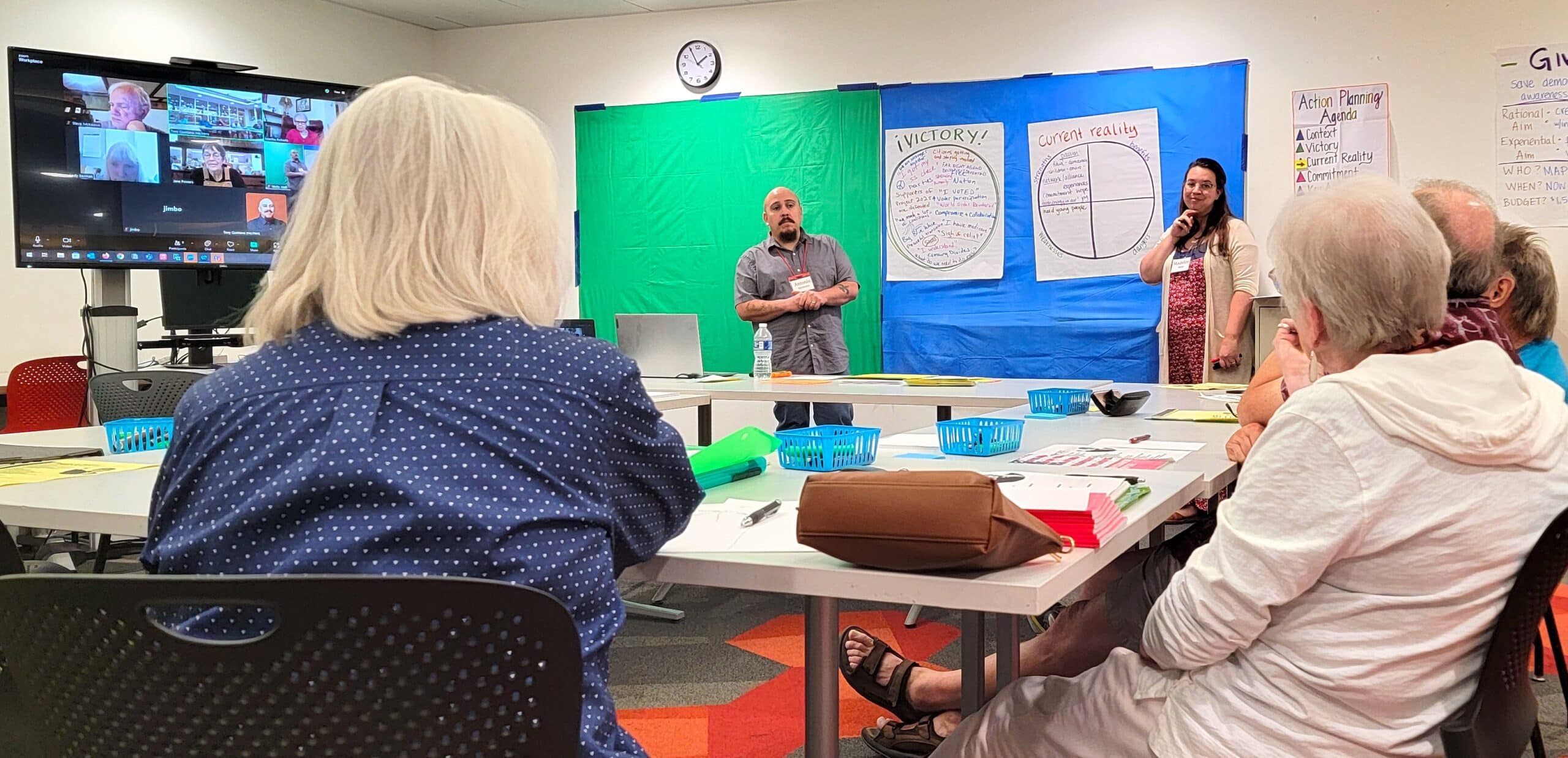At our February Community of Practice, a member of our HUE Community brought up a great question: How do you run a hybrid consensus workshop where online participants—especially those with limited tech—can contribute equally? And to add another layer of complexity, some remote attendees wouldn’t be on a computer at all—they’d be joining on their phones.
Hybrid meetings and workshops are becoming more common, but let’s be honest—they can be tricky to get right. If you’ve ever facilitated a hybrid meeting, you know the struggle is real. Just getting everyone to hear each other properly can be a headache, let alone making sure they’re actively engaged and able to contribute. Making sure everyone feels included, whether they’re in the room, on a computer, or dialing in from their phone, takes some serious planning.
Creating an engaging and inclusive experience for all is essential—especially in structured facilitation processes like a consensus workshop. But as hybrid meetings continue to become more common, we need smart strategies to make these sessions run smoothly.
That’s exactly what we tackled in our February 26 Community of Practice session. Below, we break down the situation and the best tips, tricks, and insights our community shared. Let’s dive in!

A board and multidisciplinary team—including county commissioners, directors, public health professionals, judges from district and county attorney offices, and community partners—are convening to make recommendations for systemic changes. The event will be held in a hybrid format, with one facilitator focusing on in-person participants and another facilitating remote participants via Microsoft Teams. Some attendees will be joining by phone, adding an additional layer of complexity to the workshop’s design.
How can facilitators lead this workshop in a way that ensures online attendees can contribute equally, given their limited available technology?
From our Community of Practice discussion, we compiled several practical strategies to enhance hybrid facilitation and create an inclusive experience for all participants.
Encourage online participants to come prepared by providing pre-reading materials or pre-work assignments. This allows them to engage more meaningfully despite any technological constraints.
Leverage tools like Mentimeter or Wooclap to kickstart the consensus-building process. These platforms allow all participants—including those on the phone—to provide input in real-time.
Consider bringing in an additional team member whose sole responsibility is to manage technology and provide support. At HueLife, we call people in this role “Producers”. This person can troubleshoot audio issues, assist phone participants, and ensure smooth transitions between discussion segments.
To help participants grasp complex systemic change recommendations, share concrete examples of “what this looks like in practice” before the workshop. This prepares attendees to engage in deeper discussions.
Distribute a survey ahead of time, especially for participants joining by phone. This helps gather initial insights and promotes knowledge equity by ensuring all voices are considered. While participation should be encouraged, it should not be required.
Break participants into small groups of a maximum of five for deeper discussion. Assign a scribe in advance for each online/phone group to document key takeaways in a shared document (such as Google Docs), which can then be displayed on the screen during the share-out.
For ongoing meeting series, consider requesting that participants attend in person at least every third meeting when feasible. This fosters stronger connections and engagement across the group.
Schedule a tech run-through 3-5 days before the workshop to troubleshoot any potential issues. Ensure that facilitators, producers, and scribes are comfortable using digital tools and that all technology is functioning properly.
Facilitating a hybrid consensus workshop with a mix of in-person, web-based, and phone participants requires thoughtful planning and intentional design. By optimizing audio, using collaborative tools, assigning facilitation roles, and ensuring inclusive engagement, facilitators can create a seamless experience for all attendees.
As hybrid work continues to evolve, facilitators must remain adaptable and innovative in their approach. By implementing these best practices, you can lead more effective and equitable hybrid workshops, no matter the technological limitations.
Thank you to the members of our HUE Community who shared their wisdom. We truly are better together!
Do you have experience facilitating hybrid workshops? Share your insights in the comments—we’d love to hear your strategies!
Do you have a meeting, workshop, or event coming up that you are facilitating and need advice on? Would you have won a gold medal for your amazing facilitation and think others could benefit from learning what you did? Our FREE monthly Community of Practice is the perfect space to learn, share, and grow together! It’s kind of like free professional development. You don’t have to be a formal facilitator – if you are convening groups, leading meetings, or implementing projects and plans, this is a valuable time to get advice, give advice, and learn from members of the HueLife community. After all, HUE is all about human understanding and engagement!
📅 When: Every fourth Wednesday of the month* from 2:00–3:00 p.m. CT
🌍 Where: Online via Zoom
* Exception: In July and December when we will not host our traditional virtual Community of Practice. Instead, we will host special hybrid events based in Minneapolis where you will have an opportunity to learn and network in person!
Bring your real-world challenges and questions—whether they’re broad (“How do I improve my facilitation skills?”) or specific (“I’m facilitating ____ and need advice on using ____ method.”)—and gain insights from a community eager to support and learn from one another.
Even if you’re just curious about facilitation, you’re welcome to join!
🔗 Register now for one or more sessions. We look forward to seeing you in the Zoom room!
Save the date: On April 23, we will have a guest speaker to discuss navigating challenging conversations.